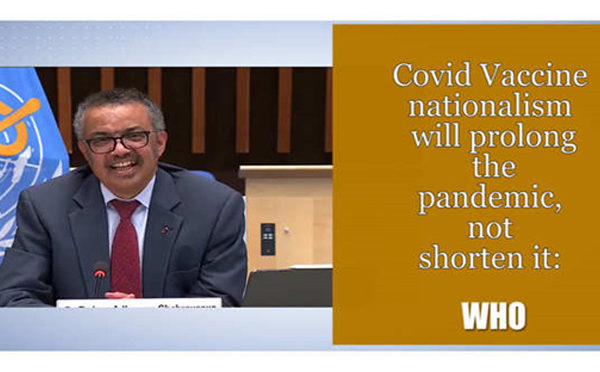The Pandemic and ‘Vaccine Nationalism’
Posted on : February 1, 2021Author : AGA Admin

Within days of declaration of the COVID19 pandemic in January 2020 scientists and virologists rigorously began research on a vaccine. Almost simultaneously, governments of countries, both developed and developing began working on deals to lock in their access to the vaccines before anybody else. With growing concern regarding “vaccine nationalism” international organisations like the World Health Organisation (WHO) have brought forth the initiative of COVID19-Global Access(COVAX) with the intent to make 2 billion doses of vaccines available to all countries by the end of 2021. So far only 172 countries have extended their support to the initiative by signing in which includes Australia. Countries like the United States (US) and Russia have decided against joining the initiative and China is yet to commit, making it evident that these countries would end up monopolising vaccine stock thereby weakening the collective endeavour of the COVAX initiative.
Before the final stage of human trials, governments of certain developed countries like the US, Britain, Germany, and France signed pre-purchase agreements with COVID-19 vaccine manufacturers ushering intheunconventional developmentof “vaccine nationalism.”Vaccine nationalism is an act of government hoarding of vaccines for inoculation of only the nationals of their respective countries and prioritising their own domestic markets before it is made available to others. This is accomplished by entering into pre-purchase arrangements by the government and vaccine producing companies. For example, the US, Britain, Japan, and European Union (EU) have spent 10 billion dollars each on procuring vaccines such as Pfizer Inc, AstraZeneca Plc, and Johnson & Johnson before their effectiveness was medically established. Quite recently, the EU has finalised an agreement for 300 million doses and the US, with a population of 328 million, has ordered 100 million doses with the right to buy an additional 500 million, making it very clear that there is an effort to corner the market. Pfizer announced that 80 percent of the vaccine doses that it would manufacture by the end of 2021 have already been bought out by countries that constitute just 14 percent of the world population.
There is a growing attempt by the affluent countries to protect their population first by trying to vaccinate them at the earliest and augment profits for their domestic markets. Such unscrupulous actions would not only make vaccines unaffordable to the poorer countries but such inaccessibility would ultimately make the fight against the global pandemic difficult if not insurmountable. Countries like India which has considerable indigenous drug manufacturing companies could be of help to their own population as well as countries that would require medical aid. However, given the size of her own population, the question remains whether export would be a viable option after her own population is covered.
The nationalism of vaccination is not new. What is worrying is that there is even today no international law that makes countries accountable for such unscrupulous actions as entering into pre-purchase arrangements which could affect global health and wellbeing by restricting availability. The world had witnessed a similar scenario after the H1N1 pandemic earlier in 2009 when the United States blocked exports and concluded pre-purchase deals worth 6 million dollars with pharmaceutical firms thereby effectively blacking availability in other countries. But the H1N1 pandemic was not as fatal as COVID19.
The attempt at market monopoly is a challenge since ending the pandemic would mean ending it globally. This is a challenge to which all states must rise to be able to revert to a pre-pandemic ‘normal’.
ShatarupaDey
Adjunct Researcher, Asia in Global Affairs





Leave a Reply